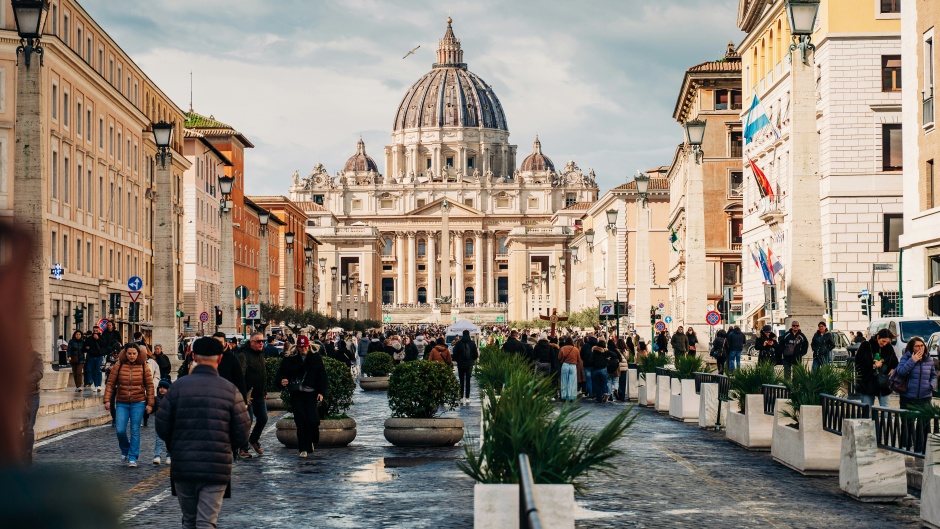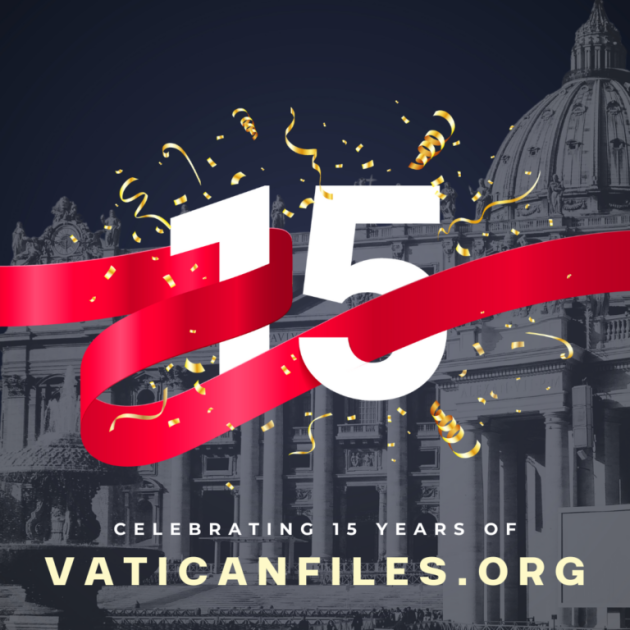Fifteen years of Vatican Files at the service of evangelical discernment
Started in 2010, the VF are a pool of resources to help evangelicals approach, understand and assess the complex reality of Roman Catholicism with gospel clarity and theological breadth.
01 APRIL 2025 · 11:48 CET

It is a modest anniversary, both for its relatively short time (only 15 years) and for the relatively small achievements to remember. Yet, it is worth mentioning for a few reasons.
It was 2010 when the website Vatican Files (VF) was opened and articles began to be posted on a regular basis, eventually becoming a monthly column.
Now the VF have almost 250 free articles offering “evangelical perspectives on Roman Catholicism” translated in multiple languages and reposted by other outlets
Now the VF have almost 250 free articles offering “evangelical perspectives on Roman Catholicism” translated in multiple languages and reposted by other outlets like Evangelical Focus, Evangelicals Now and Protestante Digital, as well as appearing in the monthly newsletter of the European Leadership Forum.The VF have 650 subscribers, but through the above-mentioned channels, the readership is far wider and global.
The VF are a small but not insignificant pool of resources to help evangelicals approach, understand and assess the vast and complex reality of Roman Catholicism with gospel clarity and theological breadth. It is a free resource at the service of evangelical discernment.
How the Vatican Files began
The origins of the VF date back to the time when I arrived in Rome in 2009. Having a published PhD on evangelical interpretations of Vatican II, having taught courses on Roman Catholicism at Istituto di Formazione Evangelica e Documentazione (Padova, Italy), and having read papers on Roman Catholicism at international conferences such as the Fellowship of European Evangelical Theologians, the World Reformed Fellowship, and in various places in Italy, the UK, Germany and France, .
I thought of ways to make my expertise available to the wider evangelical public, taking advantage also of me now living and ministering in Rome
At that time, I was also vice-chairman of the Italian Evangelical Alliance, and I offered to the World Evangelical Alliance to write regular updates for its leadership on Vatican documents and events and more generally on Roman Catholicism-related topics.It was through the WEA that I was admitted to the Vatican Press Office as correspondent. In this way, I gained direct access to official press conferences and had opportunities to interact with Vatican experts from all over the world.
The first VF were sent to a list of WEA leaders and interested people. It was only a few months later that the number of people who wanted to receive them grew considerably and the website was opened so that the articles could be posted there and become freely accessible.

Blind spot
Since 2010, the VF have assessed documents and initiatives of the late Benedict XVI up to his abrupt resignation, the election of Pope Francis and the unfolding of his pontificate, the various theological, ecumenical, missionary, cultural, institutional trends that can be observed in Roman Catholicism through the analysis of books, events, journals and other resources.
As a theologian and not a journalist, in the VF I have tended to offer a theological interpretation of the Roman Catholic world from an evangelical viewpoint.
When I researched what the evangelical world was producing in terms of its own assessment of Roman Catholicism, I came to the sober conclusion that very little was available and even less in progress.
Evangelicals were opening to the ecumenical embracement of Rome or entering joint activities with Roman Catholic agencies and movements, not having done the proper and necessary homework of trying to come to terms with the Roman Catholic system
On the one hand, Roman Catholicism had become a regular dialogue partner in many evangelical constituencies and circles world-wide; on the other hand, very little effort was put toward understanding the dynamics of what had come out of Vatican II and the present-day reality of Rome.Evangelicals were opening to the ecumenical embracement of Rome or entering joint activities with Roman Catholic agencies and movements, not having done the proper and necessary homework of trying to come to terms with the Roman Catholic system.
The latter is capable of being traditional and progressive, Marian and seemingly “evangelical”, sacramentalist and “charismatic”, papal and “missionary”, always keeping its institutional outlook and spiritual agenda.
The root problem was the lack of evangelical engagement with what had happened at the Second Vatican Council (1962-1965) coupled with a process that was leading to the weakening of evangelical distinctives with regards to the multiple and changing faces of Roman Catholicism. This was the blind spot that the VF tried to overcome.
From the VF to the Reformanda Initiative and beyond
The VF began small and unassuming, and they remain such. However, they cover ground that is hard to find in the evangelical world. As their circulation increased, so opportunities to write, speak, give papers and talks grew correspondently.
A major step forward was the launching of the Reformanda Initiative (RI) in 2016 as a more comprehensive project, brewed out of the inspiration received at the European Leadership Forum.
As an independent entity, RI’s aim was and is to “identify, unite, equip, and resource evangelical leaders to understand Roman Catholic theology and practice, to educate the evangelical church and to communicate the gospel.”
Since 2016, the Rome Scholars and Leaders Network has been gathering each year 30-40 global theologians and leaders from around the world to participate in a weeklong seminar.
A major step forward was the launching of the Reformanda Initiative (RI) in 2016 as a more comprehensive project, brewed out of the inspiration received at the European Leadership Forum
The RI podcast was launched soon after. Opportunities to write books and invitations to speak at conferences multiplied (e.g. Australia, Brazil, USA, Canada, various European countries), involving also my dear friends and colleagues Reid Karr and Clay Kannard.The work of the RI is expanding fast, although it is still organic and with potential to grow. It will be for another occasion to evaluate the impact of the RI. Suffice it now to say that it was birthed also out of the preceding experience of the VF.
As already indicated, fifteen years is a modest anniversary that should not fuel human pride but praise to God. The evangelical world needs faithful, updated and comprehensive perspectives on Roman Catholicism.
It is neither a luxury nor a speculative endeavor: it is a must that is required by the evangelical commitment to the biblical gospel. To that end, the VF have given a small but incremental contribution.
In closing, I wish to say thank you to David Valente, Gordon Showell-Rogers, Reid Karr, Clay Kannard, Greg Pritchard, Tom Wilson, Becca Paternoster, Abby Dill, Rob Clarke, David Barker, Joel Forster, Rosa Gubianas and many others whose names I may have forgotten, who in various ways (e.g. encouragement, web design, graphics, editing, translating) have helped the VF to be known over the years. Soli Deo gloria.
Leonardo De Chirico, theologian and evangelical pastor in Rome.
Published in: Evangelical Focus - Vatican Files - Fifteen years of Vatican Files at the service of evangelical discernment
